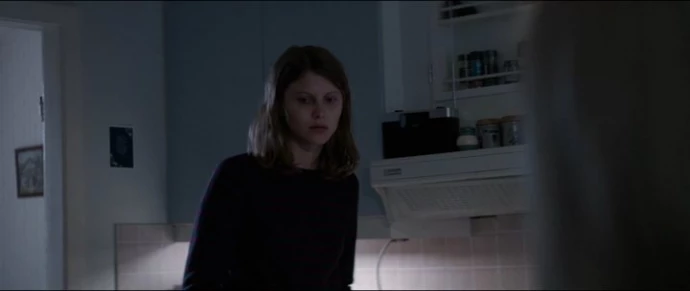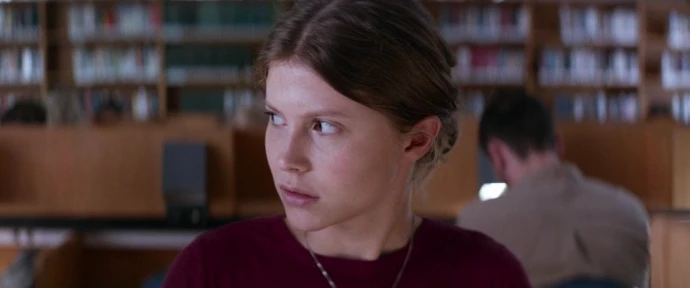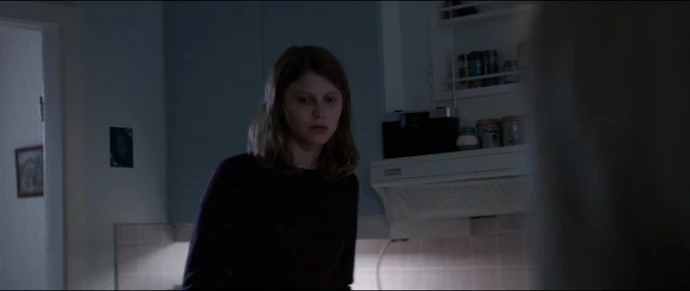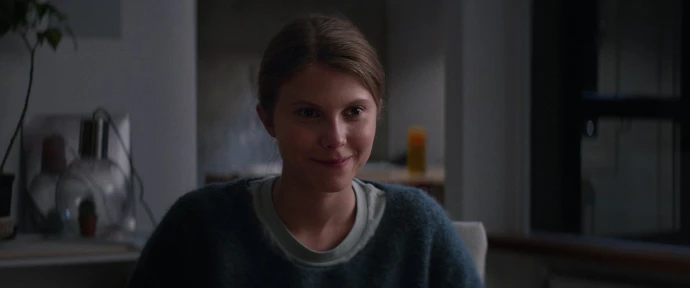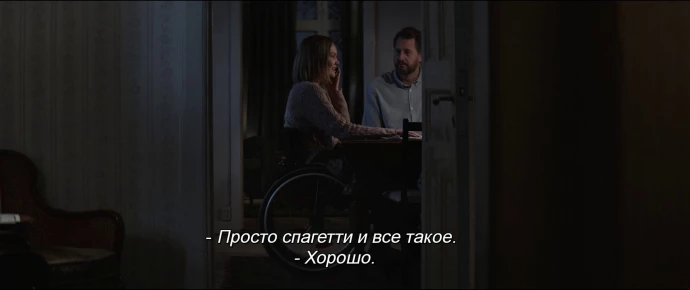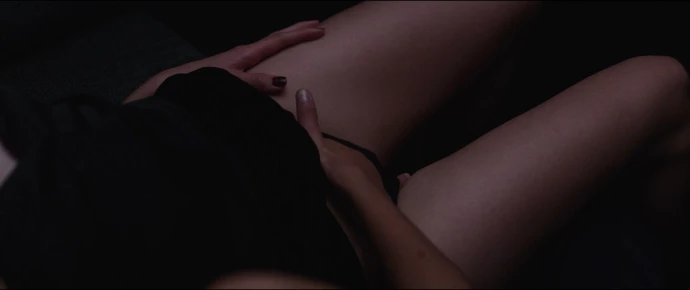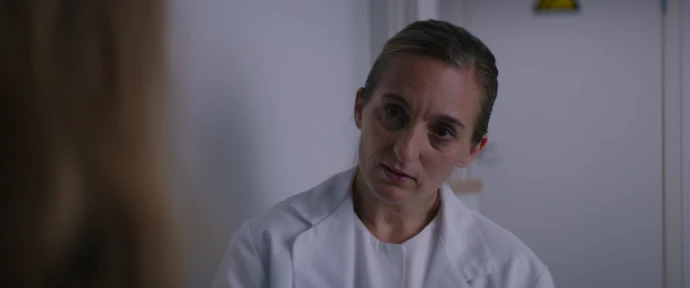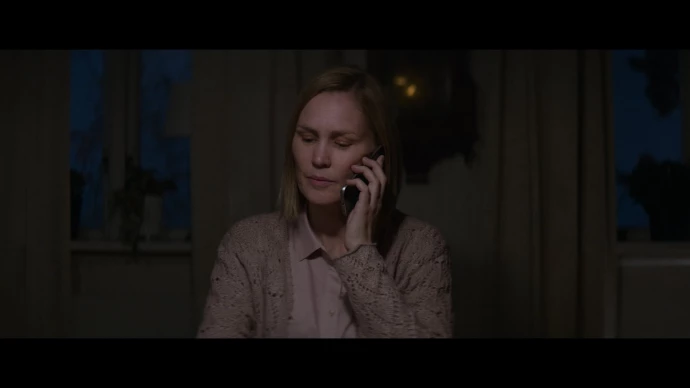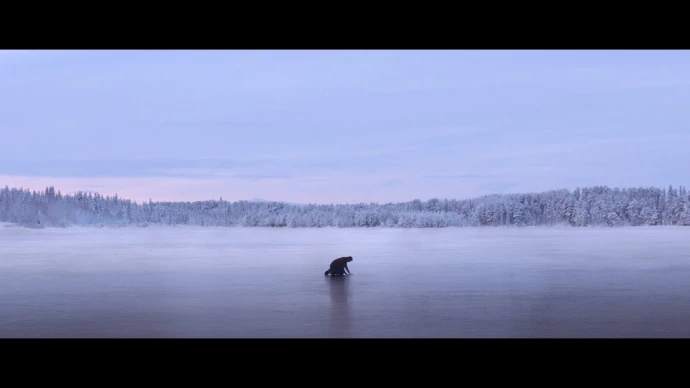action
Thelma, a young Norwegian, moves to the capital Oslo to study here. This is the first time that she is not in the immediate vicinity of her parents, who brought her up very strictly Christian and closely monitor all her actions. So she has a phone call with them every day, in which she describes what she has done during the day and is judged accordingly.
In Oslo she meets Anja, who she takes to some parties. There she drinks alcohol for the first time and falls in love with Anja, who returns her love. Due to her upbringing, Thelma cannot accept love and tries to suppress her feelings through prayer. During the encounters with Anja, Thelma had seizures, after which she was examined for epilepsy. Unusual things also happen during the seizures. B. Crows against the window of the library where Thelma and Anja are staying, or Anja comes to see Thelma believing that Thelma has asked her to do so with a message, but can no longer find the message.
Thelma then goes to a clinic to be examined. To find out the cause of the seizures, doctors try to provoke a seizure. Thelma should consciously think about unpleasant situations. While being watched, she has another attack when she thinks of Anja. In order to resolve her conflict, Thelma unconsciously lets Anja disappear during this attack. The doctors explain to Thelma that it is not epilepsy, but a that can be triggered in response to repression. Thelma also finds out that her grandmother did not die as she had believed, but is undergoing psychiatric treatment in a nursing home.
Thelma then visits her grandmother, but she no longer seems to be aware of the outside world. Thelma learns from a nurse that her grandmother claimed to have made her husband disappear and that she is very accused of having disappeared. She is also given strong medication, approved by Thelma’s father, Trond.
At university, Thelma learns of Anja’s disappearance and feels responsible for it. She goes back to her parents and tells them about her seizures. Her parents then give her medication and explain her story to her: When Thelma was a little girl, she had a brother whom she also made disappear. Then she made him reappear in the frozen lake, so that he died. The reasons are only hinted at. Thelma probably had the impression that her parents were mainly looking after her brother. Thelma’s mother then attempted suicide, which she survived but which confined her to a wheelchair. Trond tried to kill Thelma herself but subsequently raised her to be Christian and oppressive to any stronger emotion. Trond describes Thelma’s abilities in such a way that if she desires something very strongly, it can come true.
Thelma confesses to her parents that she loves Anja, which her father does not believe. Her father also prepares a syringe on the mother’s advice to suppress Thelma’s consciousness. She realizes her father’s intentions and uses her skills to kill him by starting a boat trip on fire and jumping into the lake, where he drowns. However, she also lets Anja reappear in Oslo. Taking better control of her abilities, she heals her mother so that she can walk again and returns to Oslo to live with Anja.
production
Staff, staffing and funding
The direction was taken over by Joachim Trier , who also wrote the script for the film together with Eskil Vogt . Eili Harboe , who can be seen in the film in the title role of Thelma, said at the Nordic Film Days in Lübeck about the character she played: “Thelma is a girl who has learned to suppress her emotions through her conservative upbringing — and with it their supernatural abilities. But when she finds the love of her life with the student Anja, played by Kaya Wilkins , she experiences a great liberation of her repressed feelings and allows herself to flare up her passion. So the film is also about shame, love and their relationship with their parents. Thelma finds out who she is and how she can deal with her supernatural powers. »
Regarding the meaning of religion in the film, Harboe said: “The film and its story are not, however, a criticism of religiosity or personal beliefs. He criticizes when religion is used as an instrument of power to suppress others. Because Thelma’s parents use religion so that their daughter is ashamed of who she is. »
The production received a grant of 11 million Norwegian crowns from the Norwegian Film Institute. The film was funded by the Danish Film Institute with 2.0 million crowns. Further funding came from the Copenhagen Film Fund , and the film was funded by contractual agreements with Snowglobe Film with 105,000 and 753,000 euros respectively. On the Danish side, the film was co-produced by Eva Jakobsen, Katrin Pors and Mikkel Jersin, who work for Snow Globe .
The German dubbing was based on a dialogue book and the dialogue direction by Stephan Hoffmann on behalf of Cinephon Filmproduktions GmbH, Berlin. Patrizia Carlucci speaks Anja in the German version.
Filming and film music
Filming began on September 20, 2016 in Oslo , then took place in the Swedish cities of Gothenburg , Trollhättan and Kiruna and ended after 44 days of shooting.
The total production costs amount to around 47,500,000 Norwegian kroner, which corresponds to around 5.2 million euros.
The music for the film was composed by Ola Flottum . The soundtrack for the film includes 21 pieces of music and was released by The Orchard on November 10, 2017.
publication
The Orchard secured the rights to the film in North America.
The film premiered on September 10, 2017 at the Toronto International Film Festival , was released in Norwegian cinemas on September 15, 2017, and was subsequently screened at the New York Film Festival and the London Film Festival . In November 2017 the film was shown at the Nordic Film Days Lübeck . A theatrical release in Germany took place on March 22, 2018.
Торренты
Показать фильтр
×
|
Individual evidence
- for Thelma . Voluntary self-regulation of the film industry (PDF; test number: 176277 / K).
- ↑ Patricia Batlle: In: ndr.de, November 4, 2017.
- ↑
- Brent Lang and Elsa Keslassy: In: Variety, April 20, 2017.
- In: tiff.net. Retrieved on August 23, 2017 (PDF; 852 KB)
- Brent Lang: In: Variety, July 25, 2017.
- In: bfi.org.uk. Retrieved August 31, 2017.
- Nancy Tartaglione: In: deadline.com, August 8, 2017.
- In: insidekino.com. Retrieved December 2, 2017.
- In: Rotten Tomatoes. Retrieved February 4, 2019.
- In: queer.de, March 17, 2018.
- Fabian Schäfer: In: queer.de, March 22, 2018.
- Zack Sharf: In: indiewire.com, December 18, 2017.
- Kristopher Tapley, In: Variety, December 6, 2017.
- Chris Evangelista: In: slashfilm.com, December 4, 2017.
- Internet Archive ) Info: The archive link was inserted automatically and has not yet been checked. Please check the original and archive link according to the instructions and then remove this notice. In: phoenixfilmcriticssociety.org. Retrieved January 7, 2018.
- In: wafca.com, December 8, 2017.

